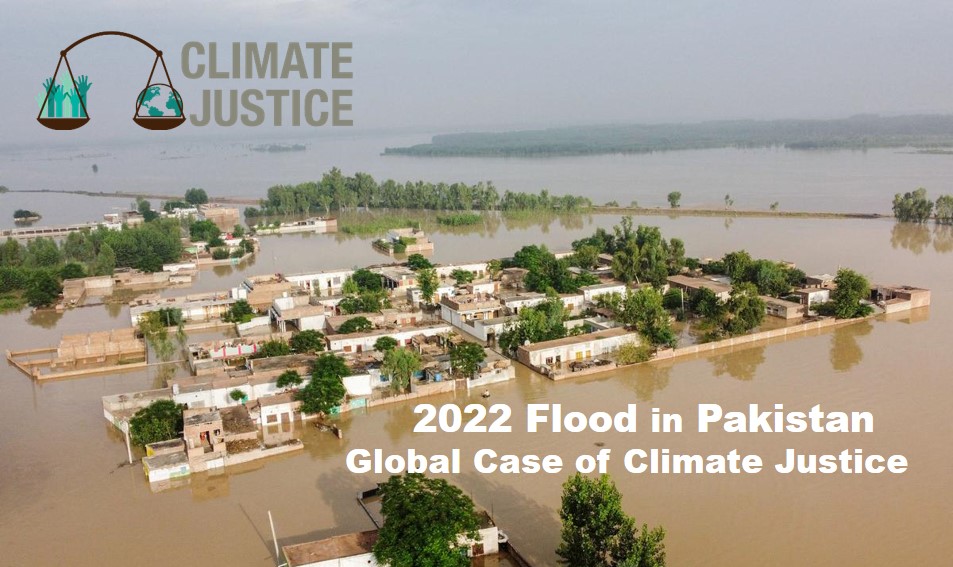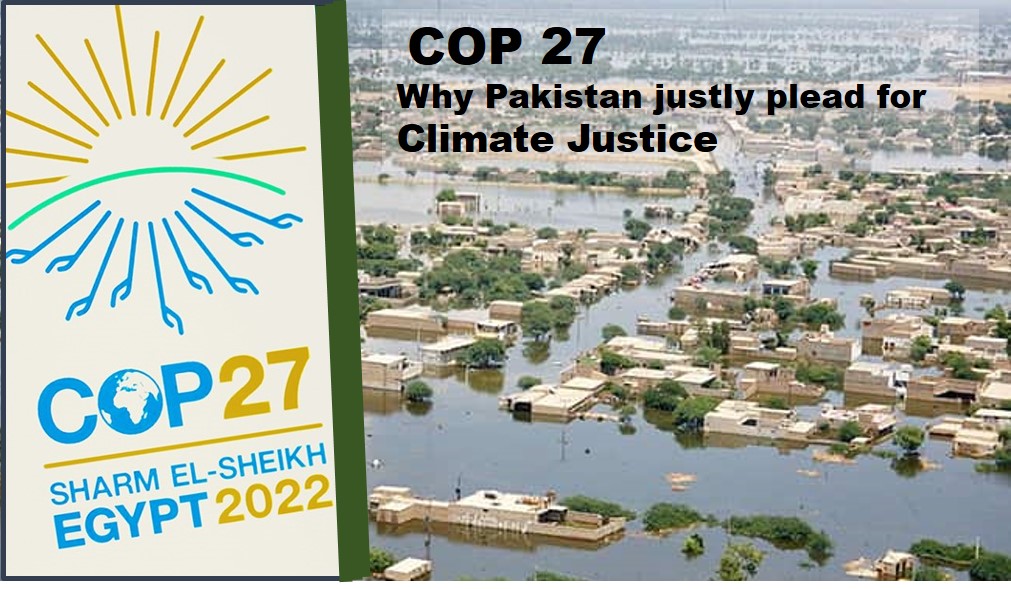The 27th edition of the Conference of the Parties (COP 27) to the UNFCCC kicks off in Sharm el-Sheikh, Egypt. A number of world leaders and scientists will spend two weeks debating how to arrest planet earth’ global warming, carbon reduction and protect humanity from the perils of climate change. This year the main objective of the high-level segment attended by heads of state and government are to highlight support for Climate Action pertaining to the reduction of emission gap. While Pakistan would mainly like to plead its case of Climate Justice because developing nations have been suffering the brunt of the climate consequences of the global warming crisis.
Pakistan is the most recent victim of global warming, which caused widespread floods and unprecedented rains in a country already facing a major economic crisis. A World Bank report, released two weeks ago, estimated that weather and climate-related disasters have affected over 75 million Pakistanis in the past three decades, with estimated economic losses of over $29 billion, or roughly $1 billion a year. The report noted that the country needs at least $16 billion to deal with the devastations caused by this year`s floods.
COP 27 & Pakistan’ NDCs
The Pakistan Pavilion at the COP 27 venue will be invaluable for projecting Pakistan’s environmental agenda, in particular the massive tree planting campaign, Living Indus Initiatives, the new Alternative and Renewable Energy Policy, the Electric Vehicles Policy and, above all, Pakistan’s updated Nationally Determined Contributions to Climate Action( NDCs) developed last year. Prime Minister Shehbaz Sharif is scheduled to attend the COP27 as he has been made the vice-chairperson for the COP27 after his advocacy for an urgent climate action plan.

However, Pakistan’ main focus would likely be the Climate Justice. The world has warmed by about 1.2C since the industrial era began and temperatures will keep rising with USA, China and EU among the top contributors in global emissions. While countries like Pakistan that have contributed the least to global warming are often battered by the worst impacts. Over the past 50 years, the annual mean temperature in Pakistan has increased by roughly 0.5 degrees. Yet, it is ranked among the world’ top 5 countries, vulnerable to climate change’ devastation globally.
“Loss and Damages”
The catastrophic flooding that submerged Pakistan serves as evidence in this regard. Besides the scant international response to the disaster have sharpened developing countries’ call for finance to help them recover from climate-induced damages. A hotly contested topic, therefore, which can ignite fireworks right at the outset of COP27 is the “Loss and Damage”, specifically the establishment of a financial mechanism for addressing the irreparable losses and damage caused by climate-induced extreme events in least developed countries and small island developing states. The voting on the agenda of the COP on Day 1 is, therefore, crucial.
However, at a recent US State Department briefing ahead of COP 27, their climate envoy John Kerry said he is “anxious to see the loss and damage issue dealt with upfront and in a real way at the COP. We anticipate that it will be an agenda item, and we`re perfectly comfortable helping it to be that, which means at some point you`ve got to have an outcome… and we certainly support coming out with some kind of structure that provides for appropriate financial arrangements which we hope to arrive at”. Mr Kerry also told various media outlets this week that they would be open to discussing “potential financial arrangements” with the victims, after years of avoiding the topic. His comments open up the possibility of more support for the victims of the climate change, like Pakistan.
Climate Justice for Pakistan
Pakistan`s Minister for Climate Change Sherry Rehman, who has repeatedly spoken about loss and damage and the issue of climate justice, has briefed that Pakistan is seeking to operationalise this agenda at the upcoming COP27 summit. Pakistan, which has been left with an estimated $30 billion bill, will be front of the pack in demanding support. Sherry Rehman, the country’s climate minister, has done the media rounds to explain the scale of the reconstruction challenge. As the nation chairs a group of 134 developing countries, known as the G77, she will be key in driving a push for a new funding stream to respond to climate damages.

Sherry Rehman has rightly pointed that Pakistan is on the frontline of vulnerability, while being an almost negligible emitter and firmly believed that developing nations have been suffering the brunt of the climate consequences of the global warming crisis. “All we are saying is that the burden of these emissions should be shared equitably, not equally, let alone disproportionately, which is the case right now.”
Let’s hope the outcome of the 27th edition will be fruitful this year. However, we are witnessed the countries that are major contributors to global warming “repeatedly fall short” on the pledges they have made at COPs. Because climate reparations has been an issue pushed consistently down by rich nations in the past.
By
Editorial, Infocus


